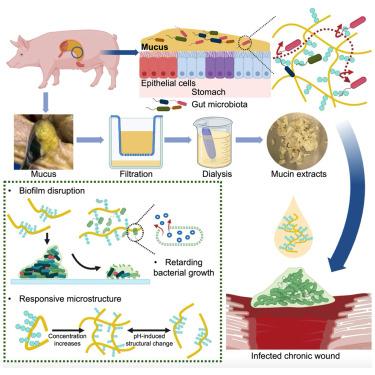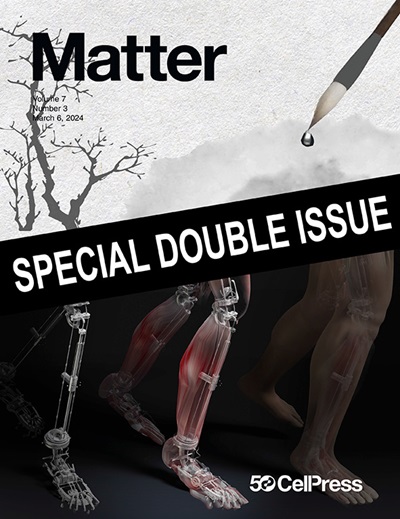Antibiofilm and pH-responsive properties of nature-derived mucin biomaterials and their potentials for chronic wound care
IF 17.5
1区 材料科学
Q1 MATERIALS SCIENCE, MULTIDISCIPLINARY
引用次数: 0
Abstract
Effective wound-infection management requires reducing bacterial load and avoiding the formation of bacterial biofilms. In this study, we characterized the structure, composition, and function of mucin extracted from the porcine stomach and demonstrated its pH responsiveness, bacterial load control, and biofilm disruption capabilities. The microstructure of the mucin extract shifts from aggregated to relaxed state and its structure changes from gel to solution as its surrounding pH increases. The deterioration of wounds, characterized, among others, by changes in pH, can be monitored by observing changes in the apparent structural features of the mucin extract, e.g., turbidity. Moreover, the extract displays membrane toxicity against lipid membranes and bacteriostatic effects on both gram-negative and gram-positive bacteria. Notably, the extract also promotes the dispersion of bacterial biofilms after 24 h and 48 h of formation. The biocompatibility, pH responsiveness, and antibiofilm properties of mucin present a novel approach for treating chronic wound infections.


天然粘蛋白生物材料的抗生物膜和 pH 值响应特性及其在慢性伤口护理方面的潜力
有效的伤口感染管理需要减少细菌负荷,避免形成细菌生物膜。在这项研究中,我们对从猪胃中提取的粘蛋白的结构、组成和功能进行了表征,并证明了其对 pH 值的反应能力、细菌负荷控制能力和生物膜破坏能力。随着周围 pH 值的升高,粘蛋白提取物的微观结构会从聚集状态转变为松弛状态,其结构也会从凝胶状转变为溶液状。通过观察粘蛋白提取物表观结构特征的变化(如浑浊度),可以监测伤口的恶化情况,其中包括 pH 值的变化。此外,该提取物对脂质膜具有膜毒性,对革兰氏阴性菌和革兰氏阳性菌均有抑菌作用。值得注意的是,萃取物还能在细菌生物膜形成 24 小时和 48 小时后促进其消散。粘蛋白的生物相容性、pH 值响应性和抗生物膜特性为治疗慢性伤口感染提供了一种新方法。
本文章由计算机程序翻译,如有差异,请以英文原文为准。
求助全文
约1分钟内获得全文
求助全文
来源期刊

Matter
MATERIALS SCIENCE, MULTIDISCIPLINARY-
CiteScore
26.30
自引率
2.60%
发文量
367
期刊介绍:
Matter, a monthly journal affiliated with Cell, spans the broad field of materials science from nano to macro levels,covering fundamentals to applications. Embracing groundbreaking technologies,it includes full-length research articles,reviews, perspectives,previews, opinions, personnel stories, and general editorial content.
Matter aims to be the primary resource for researchers in academia and industry, inspiring the next generation of materials scientists.
 求助内容:
求助内容: 应助结果提醒方式:
应助结果提醒方式:


